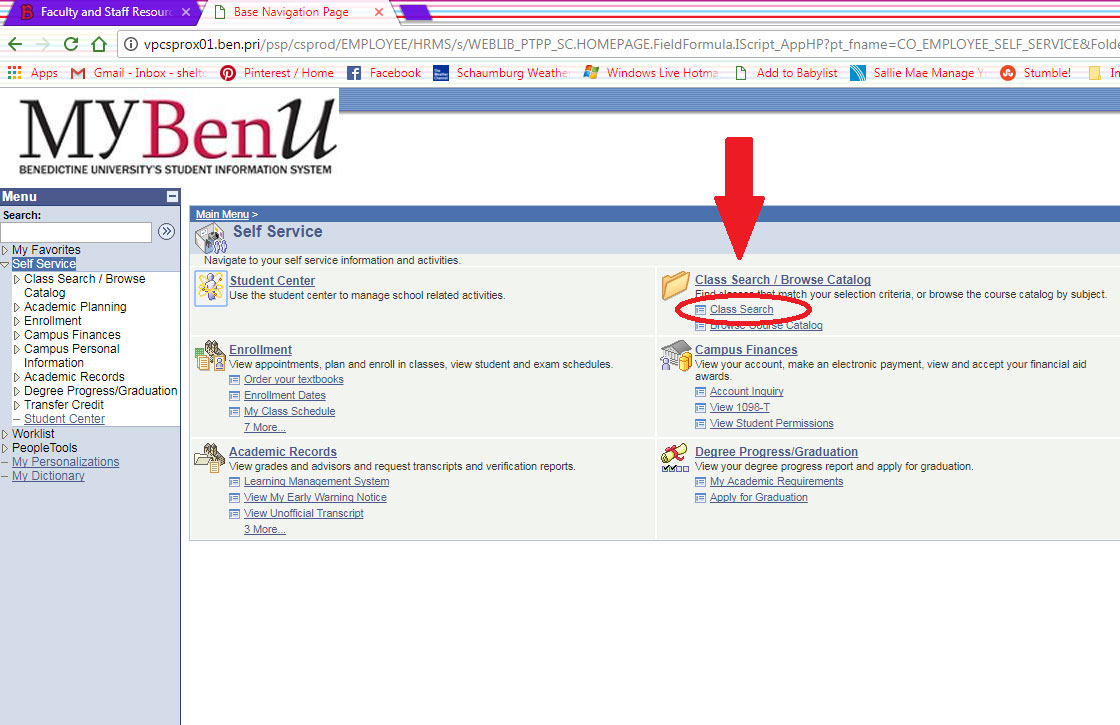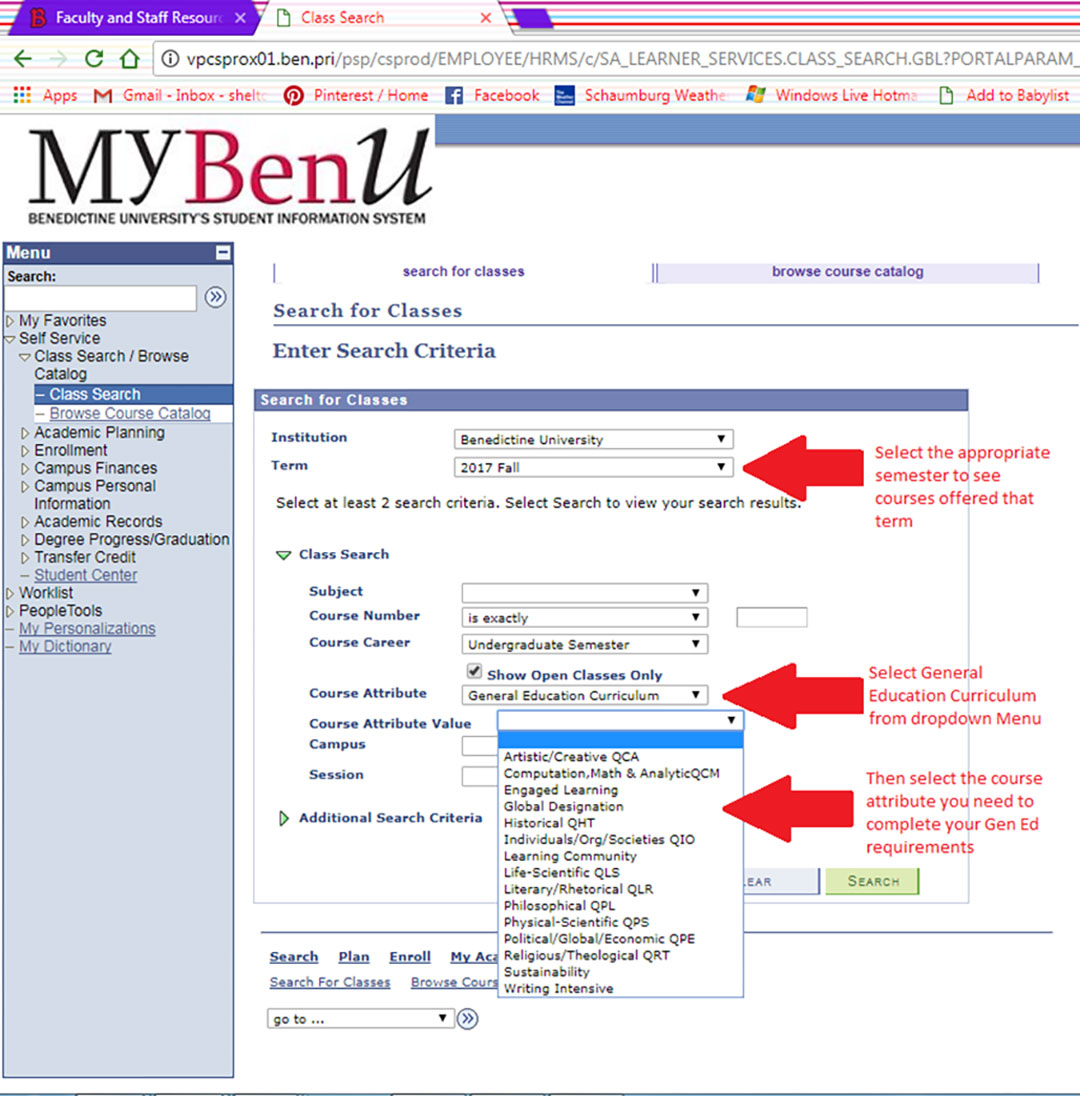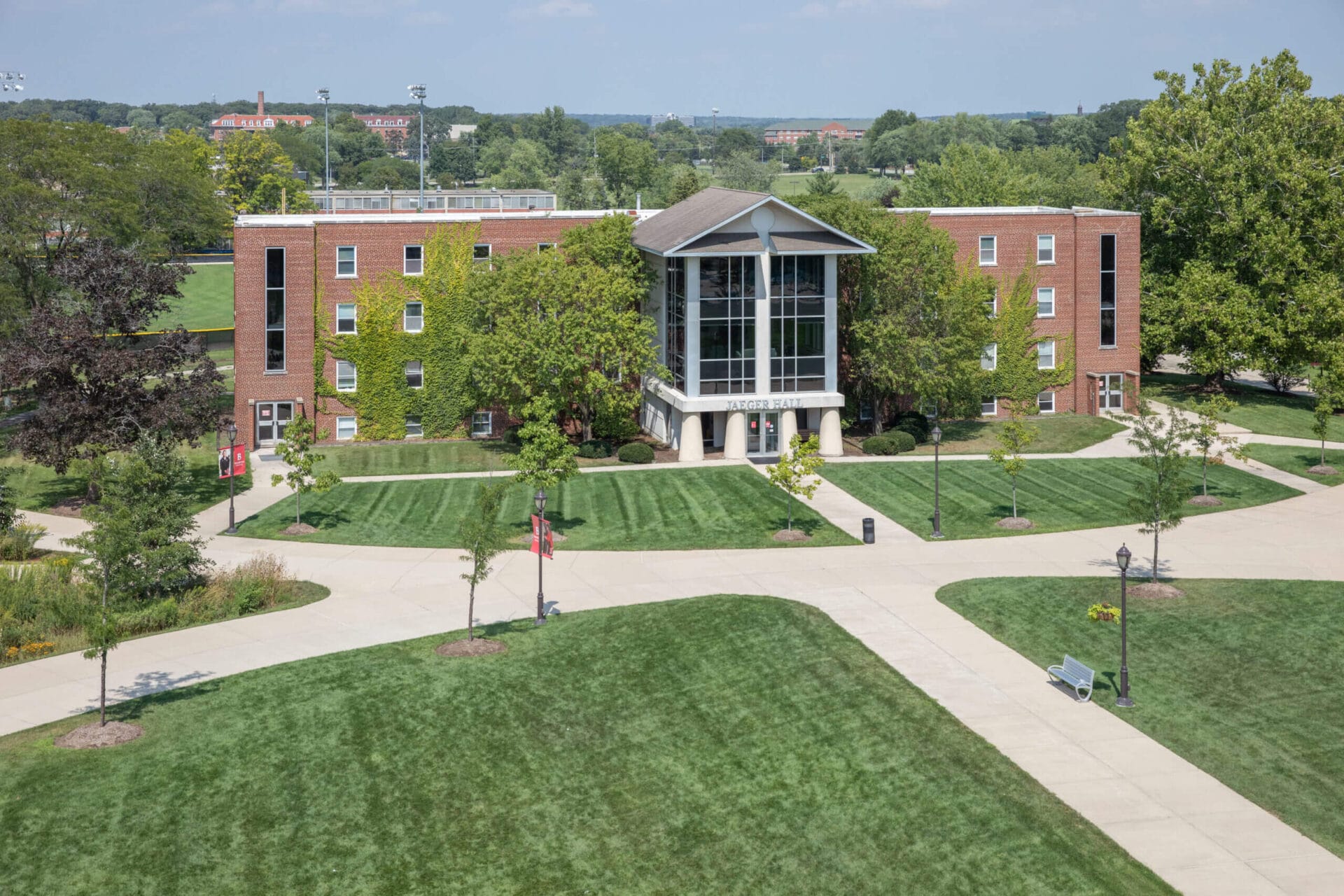
General Education Curriculum
General education courses provides the experiences, knowledge and skills you need to successfully manage life’s challenges. Benedictine’s General Education Curriculum emphasizes interdisciplinary learning, community, and real-world experiences that link classroom knowledge with current problems.
Your major will prepare you for your first job, but General Education will prepare you for the rest of your life.
General education courses provide the experiences, knowledge and skills you need to successfully manage life’s challenges. They teach students that there are multiple ways to study and solve problems, and stress the importance of being an informed and active citizen. Benedictine’s General Education Curriculum emphasizes interdisciplinary learning, community, and real-world experiences that link classroom knowledge with current problems. The curriculum includes Basic Skills courses, Distribution Requirements and an emphasis on global and sustainability issues. In addition, we require two Interdisciplinary Seminars and experiential learning (which includes a Learning Community or an Engaged Learning experience).
At Benedictine University, our General Education Curriculum is at the heart of all undergraduate education. The General Education Curriculum requires all undergraduates to complete a course of study with experiences that help them to learn multiple disciplinary approaches and modes of problem-solving. It develops students’ critical skill and knowledge areas for active and responsible citizenship and stewardship of the earth, lifelong learning, global awareness, integrative knowledge and effective interpersonal communication. The curriculum includes coursework and experiential learning to connect education in the classroom with the problems facing our interconnected world.
- Demonstrate critical thinking and analysis
- Identify, study and solve problems
- Achieve computational skills and an ability to understand and interpret numerical data
- Work cooperatively as a member of a team
- Express concepts and ideas clearly, creatively and effectively in oral and written forms
- Understand and interpret written, oral, visual and aural forms of communication
- Demonstrate interpersonal communication skills consistent with effective academic discourse
- Navigate different information formats and media technologies to find pertinent information
- Evaluate sources of information critically to conduct responsible research
- Become an active, informed and creative user of established and emerging technologies
- Recognize the interdependence of peoples and nations, and understand the forces that connect and divide them
- Understand the benefits of diversity of perspectives, abilities and cultures
- Understand the relationship between language and culture, and communicate effectively and respectfully across cultural boundaries
- Relate the person to community and the local to the global
- Engage ethical problems thoughtfully and actively, and contribute to the work of peace and social justice
- Understand conflict resolution processes
- Practice stewardship of self and the environment, and understand the principles of wellness and sustainability
- Develop the traits of good citizenship, and gain knowledge and skills necessary for civic engagement
- Develop intellectual curiosity and a desire for lifelong learning
- Strive for a life lived in balance
- Cultivate leadership skills
- Nurture the capacity for creative and artistic expression
- Use knowledge, theories and methods from the arts, humanities, natural sciences and social sciences to raise and address questions germane to those areas of study
- Recognize relationships among different disciplinary approaches to the study of human cultures and the natural world
- Integrate learning from different disciplines to illuminate intersecting topics of investigation
- Explore connections between classroom knowledge and real-world experiences
- Understand the Catholic intellectual tradition: its philosophy, theology, practice, history and engagement with questions of our time
- Understand the Rule of St. Benedict and the contributions of Benedictine monasticism to history, culture, spirituality and education
- Show knowledge of how different religions and philosophies view the human person, spirituality and the divine
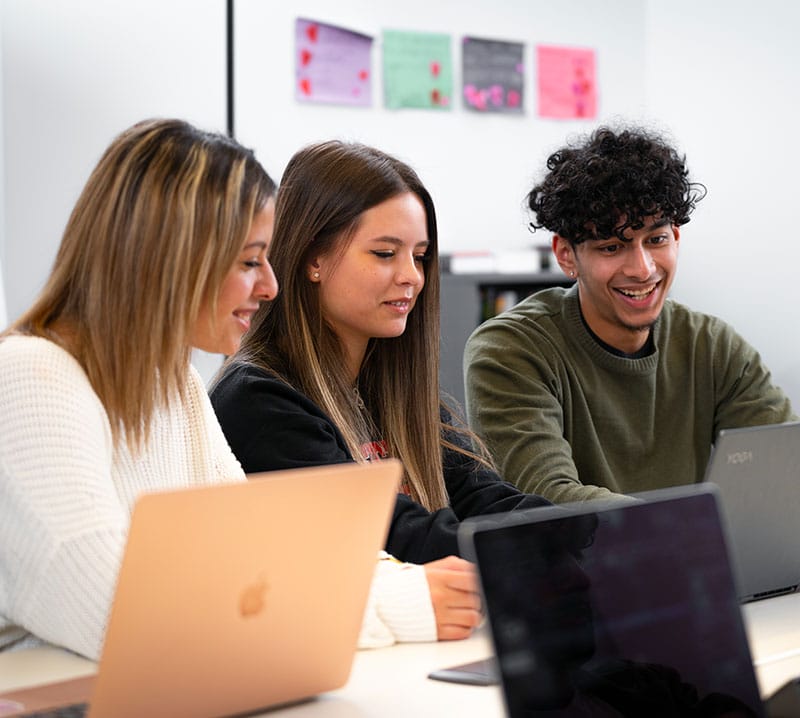
Requirements
The general education curriculum includes:
- Basic Skills Courses
- Distribution Requirements
- Writing Intensive Courses
- Global and Sustainability Courses
- Interdisciplinary Seminars
- Learning Community or Engaged Learning experiences
- Academic Writing
- Writing, Research and Information Fluency
- Quantitative Reasoning and Numeracy
- Speech
These courses give you a chance to discover your talents, find new interests and strengthen your understanding of how your major fits into the wider world.
Students take one course in each of the following areas:
Artistic and Creative
Computational and Mathematical Analysis
Historical
Life Science
Literary and Rhetorical
Philosophical
Physical Science
Individuals, Organizations and Societies
Political, Global and Economic Systems
Religious and Theological
Arts and Humanities: 15 semester credit hours
3 semester credit hours in the Creative Arts (QCA).
3 semester credit hours in Theology or Religious Studies (QRT).
3 semester credit hours in Philosophy (QPL).
3 semester credit hours in History (QHT).
3 semester credit hours in Literature and Rhetoric (QLR).
Natural Sciences: 9 semester credit hours
3 semester credit hours in the Life Sciences (QLS).
3 semester credit hours in Physical Sciences (QPS).
3 semester credit hours in Computational and Mathematical Analysis (QCM).
Social Sciences: 6 semester credit hours
3 semester credit hours in Social Science: Social Science I: Individuals, Organizations and Societies.
3 semester credit hours in Social Science: Social Science II: Political, Global and Economic Systems.
Students take three Writing Intensive courses: an IDS 2000-level course, a Writing Intensive course in their major, and one other course which is designated as Writing Intensive.
At Benedictine, we strive to develop knowledge of our interconnected global society and the responsibilities we have to other cultures, peoples and the natural world through our General Education Curriculum across all colleges and departments. These are not additional course requirements. Global and Sustainability designated courses are found in courses meeting the Distribution requirements, courses within majors, Learning Communities and IDS courses.
Interdisciplinary Seminars (IDS) are courses that integrate and synthesize multiple perspectives on complex issues such as environmental change, health care or global cities. IDS courses aim to help every student begin to apply and appreciate holistic thinking.
The IDS 2200-level classes focus on the Benedictine and Catholic Intellectual Heritage; the IDS 3300-level classes focus on the Human Dignity and the Common Good.
Many of the seminars will also meet other requirements such as the Global, Sustainable or Writing Intensive designations, and/or the Learning Community/Engaged Learning requirement.
IDS 200-level Catholic and Benedictine Intellectual Tradition
- IDS 2201
- IDS 2202 Fulfills Sustainable requirement
- IDS 2203 Fulfills Global requirement
- IDS 2204 Fulfills Global and Sustainable requirements
IDS 300-level Human Dignity and the Common Good
- IDS 3301
- IDS 3302 Fulfills Sustainable requirement
- IDS 3303 Fulfills Global requirement
- IDS 3304 Fulfills Global and Sustainable requirements
What are Learning Communities?
Learning Communities are experiences in which students integrate and apply knowledge learned in their classes with experiences outside the classroom. These communities are designed to have students work together in groups in order to learn and problem-solve more effectively. All Learning Communities therefore include course-related activities that take place outside the classroom or off-campus. At Benedictine University, Learning Communities can be stand-alone courses, two linked courses or a group of students who take a series of courses together (cohort). Examples of Learning Communities at Benedictine University include our music ensembles, Model United Nations, the Scholars Program, the Catholic Studies Learning Community, Christian-Muslim dialogue, mission service trips and faculty-led study abroad.
Why take Learning Community courses?
Studies show students can learn effectively in the type of social environment that Learning Communities provide. They enhance learning, heighten student engagement and result in greater student success both academically and personally. At Benedictine University, Learning Communities will allow you greater contact and personal interaction with faculty members inside and outside of the classroom. Learning Communities will enrich your educational experience and help you to succeed academically and after graduation.
Engaged Learning experiences at Benedictine University might involve work in the larger campus community, a juried public performance or show of visual art or music, significant volunteer service, or an internship or professional project, public blog or e-portfolio. The common element in all of these experiences is that the student applies classroom learning and skills to experiences in the wider world. Engaged Learning experiences help prepare students for full participation in the world as effective citizens, community members and ethical professionals.
Some Engaged Learning experiences may be performed as a component of a traditional course while others are free-standing, such as internships. Some Engaged Learning experiences are paired with Learning Communities.
Requirements for Transfer Students
Transfer students often satisfy the Basic Skills and Distribution Requirements at the institutions they attended before coming to Benedictine. Many courses taken prior to attending Benedictine will also satisfy the Global and/or Sustainability requirement(s).
Once students are at Benedictine, major and IDS courses will satisfy the Writing Intensive, Global and Sustainability designations, and usually the Learning Community/Engaged Learning requirement. Each of these designations can be searched for in MyBenU.
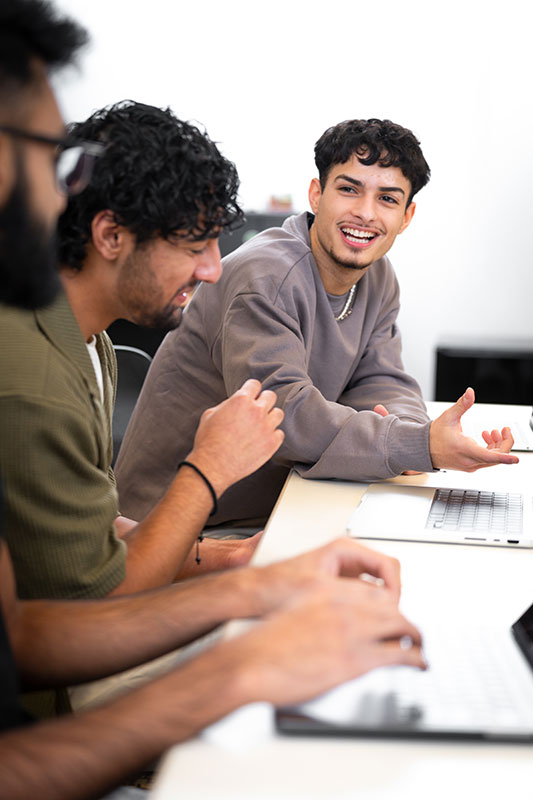
The Illinois Articulation Initiative (IAI) is a statewide transfer agreement that provides for the successful transfer of the IAI General Education Core Curriculum (GECC) completion between participating Illinois institutions. The University has been a participating member of the IAI since 1998 and as such accepts IAI GECC from participating institutions as meeting the lower-division Benedictine University General Education Curricular requirements can be found HERE.
WI courses are designed to emphasize the writing process and writing development through a sequence of designated classes taken at different points in a student’s career at Benedictine University. All undergraduates are required to take three designated WI courses as follows:
- IDS 2201-2204 WI, Catholic and Benedictine Intellectual Traditions.
- WI designated course in the major.
- One additional WI designated course.
Transfer students who have completed all distribution requirements (with the exception of the IDS seminars and the LC/EL co-curricular requirements) will be exempt from the third WI course requirement but must complete IDS 2201/2202/2203 or 2204 WI and the required WI in the major.
Transfer students who have credit for the equivalent of the required WI course in the major will not be required to retake that WI course in the major but must complete IDS 2201/2202/2203 or 2204 WI and a second additional WI course of their choice.
Transfer students who have completed all distribution requirements (with the exception of the IDS seminars and the LC/EL co-curricular requirements) AND taken the transfer equivalent of the WI in the major must still take IDS 2201/2202/2203 or 2204 WI and one additional WI course of their choice.
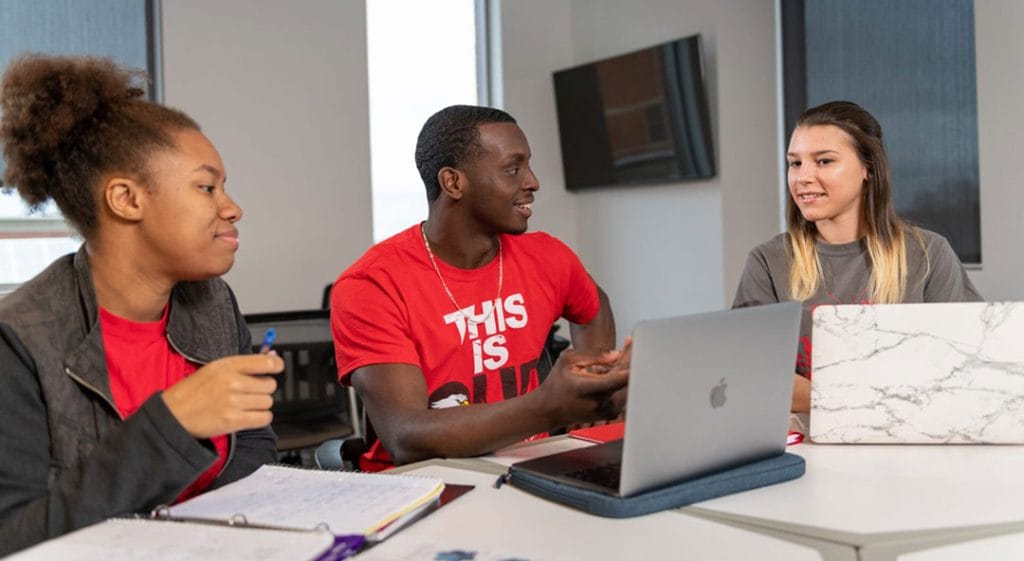
General Education Curriculum
Catalog links
Steve Burgess, Ph.D.
Program Director
General Education Curriculum, Learning Communities (LCOM) & Engaged Learning
630-829-1368
[email protected]

